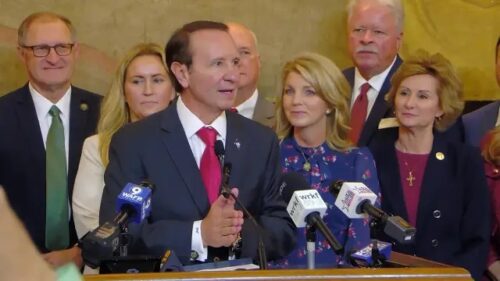
12.5.24 – BRProud –
Gov. Jeff Landry signed bills from the tax reform special session at the Louisiana State Capitol on Thursday, Dec. 5.
Gov. Jeff Landry has signed into law the slate of tax reform bills the legislature passed in the special November session. They include a cut to income taxes, and a raise in the sales tax among other changes.
“For far too long, parents have watched kids leave this state for better opportunities. We’ve watched businesses uproot themselves and supplant themselves in other states as well and it’s frustrating,” Landry said.
On the sales tax, the statewide sales tax will be increased to 5% for five years. The state was already staring down a potential $700-million shortfall with the temporary .45 cent sales tax set to sunset in 2025. There also had to be a way to make up for the major cut to individual and corporate income taxes.
“I believe that we have finally, once and for all, basically placed the fiscal cliff in a fiscal closet so that we never see it again,” Landry said. “And we placed a state on a path under which revenue is going to be a lot more stable and our ability to manage the budget and affairs of this government.”
This 5% tax will be on top of each local sales tax. Some cities in Orleans, Bossier, Calcasieu, and East Baton Rouge, will be seeing an overall sales tax of 10% or higher. This will go into effect starting in the new year. Also, a number of digital goods were added to the state sales tax in an attempt to modernize the tax collection base.
The governor said this change was necessary for the individual income tax reduction to a flat 3% rate. The first $12,500 are exempt from tax. Corporations will see an income tax cut as well as the rate is lowered to a flat 5.5%.
The legislature also voted to do away with the franchise tax altogether which some legislators said was not business friendly and that Louisiana is one of the few states in the South that collects that tax.
“You can only do so much with that kind of government work without your tax policy actually helping to drive growth, which is what this state needs,” said Adam Knapp, CEO of the Committee of 100 for Economic Development.
With these reductions to the state’s revenue, there were some gaps in funding. One way the legislature will be making up that lost revenue is through diverting $280-million from the construction mega project fund. This will be collected over two years.
Several tax credits that drew many advocates to the state capitol to keep them in place have been maintained, albeit at a lower amount. The film tax credit is being kept at $125-million annually and the historical preservation credit is being kept at $85-million.
The part of the plan that voters will get a say in will be on a March ballot. The proposed constitutional amendment would dissolve a number of state fund accounts including the Revenue Stabilization Fund, which is a secondary back up fund to the Budget Stabilization Fund. The money in those accounts would be used to pay down teacher retirement debt. The savings that schools would have from not having to make those payments would make the teacher pay stipend from last year permanent. Schools that do not pay into the teacher retirement accounts would be backfilled by the legislature to cover the pay raise cost.
